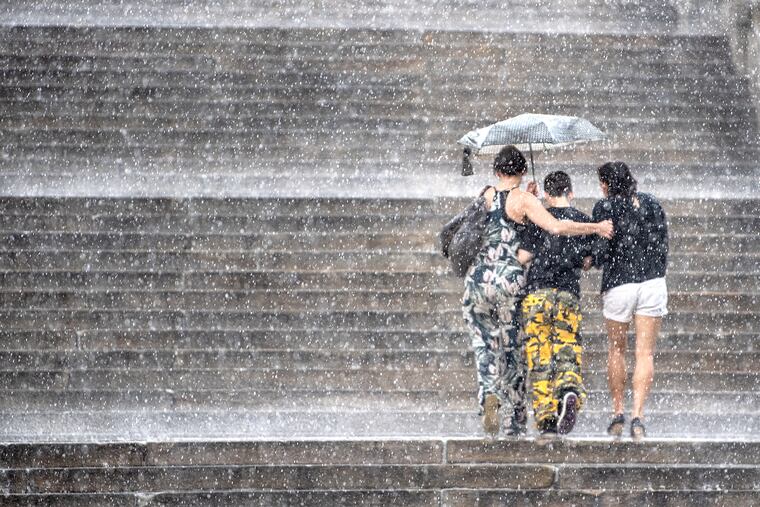Election Day weather: Near 100% chance it won’t affect voter turnout
That rain affects voter turnout is a long-held belief. But does it hold water?

The enduring concept that Election Day weather affects voter turnout dates to the 19th century. And the mention of weather has long been a staple of Election Day news stories.
But in reality, does it hold water?
For a variety of reasons, the impact of weather on voting is difficult to quantify, and the evidence is conflicted. An Inquirer study of 30 years of mayoral, gubernatorial, and presidential turnouts in Philadelphia failed to identify any impact.
Tuesday’s forecast for the Philadelphia region called for a slight chance of showers between 7 and 10 a.m., then dry conditions until the polls close.
But political observers see a 100% chance that weather will have no effect on turnout and expect 75% or more of voters to find something to do other than go to the polls.
“What drives turnout is energy,” said David Thornburgh, executive director of the Committee of Seventy, the election-watchdog group. “It’s usually negative energy.”
That energy likely will be in short supply in this off-year election, said Thornburgh and longtime political observer and pollster G. Terry Madonna, a professor at Franklin and Marshall College in Lancaster.
“What’s going on right now is a high degree of partisanship," Madonna said, but "we’re not electing Congress, we’re not electing a president.”
» READ MORE: The top races to watch in the Philadelphia suburbs in the 2019 election
» READ MORE: Top New Jersey races to watch in the 2019 election
In off-year local elections, Thornburgh said, expect about a 20% turnout, give or take a few percentage points. That’s weather permitting or not permitting. Neither he nor Madonna ascribe much credence to the weather’s power.
Madonna said that a blizzard, or something like the Halloween night squall line hitting at a peak voting hour, might have an effect, but voters have proved again and again that if they are motivated, inclement weather won’t stop them. If they aren’t motivated, the sunshine won’t matter.
» READ MORE: Pennsylvania judicial races are sleepy. Even so, groups are spending $2 million on TV ads.
A fundamental problem with quantifying the effects of weather on voting would be identifying all the variables and then isolating what the atmosphere had to do with the results. Who is running? What’s at stake? Who’s putting up the money?
One ambitious national study published in the Journal of Politics in 2007 concluded that an inch of rain on Election Day in a given location could reduce turnout by 1%. However, the study was based on 24-hour calendar-day rain totals rather than the specific times in which the rain fell. Such data would be significantly harder to assemble.
Rain between 4 and 7 p.m. theoretically would have a far greater impact than a downpour after 8 p.m.
Earlier studies found little or no impact. The Inquirer analysis of results from 1970 to 1999 was a washout: It rained on half of the Election Days with the 10 highest turnouts; meanwhile, seven of the 10 lowest-turnout days were rain-free.
Regarding the weather-voter research, Thornburgh said, “I don’t pay that much attention to it.”
Madonna has theorized that the case for rain affecting elections received a big boost from historian Theodore H. White’s The Making of the President, 1960, a groundbreaking examination of one of the closest elections in U.S. history.
White attributed the huge turnout to the generally favorable weather across the country, although the nominees, Democratic Sen. John F. Kennedy and Republican Vice President Richard M. Nixon, likely had something to do with that.
In his book The Weather Factor, weather historian David Ludlum noted that the exception on Nov. 8, 1960, was heavy rain in Illinois, and he said it was at least possible that the rain might have been more of an inconvenience in the less-populated areas, dominated by Republicans, than in urban and Democratic Chicago.
Madonna had his own take. He has hypothesized that in 1960, Chicago Mayor Richard J. Daley, a powerful Democrat, was bigger than nature. Of the influence of the mayor’s political machine, Madonna said, "Daley had those votes already counted.”
» READ MORE: ‘MAGA’ and warnings of ‘radical extremists’: Trump-era political acrimony makes its way to Philly-area races